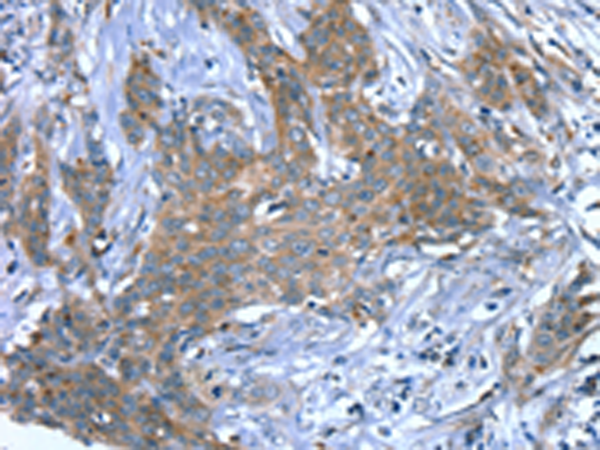

| WB | 咨询技术 | Human,Mouse,Rat |
| IF | 咨询技术 | Human,Mouse,Rat |
| IHC | 1/25-1/100 | Human,Mouse,Rat |
| ICC | 技术咨询 | Human,Mouse,Rat |
| FCM | 咨询技术 | Human,Mouse,Rat |
| Elisa | 1/1000-1/2000 | Human,Mouse,Rat |
| Aliases | RISC; HSCP1 |
| WB Predicted band size | 51 kDa |
| Host/Isotype | Rabbit IgG |
| Antibody Type | Primary antibody |
| Storage | Store at 4°C short term. Aliquot and store at -20°C long term. Avoid freeze/thaw cycles. |
| Species Reactivity | Human, Mouse, Rat |
| Immunogen | Fusion protein of human SCPEP1 |
| Formulation | Purified antibody in PBS with 0.05% sodium azide and 50% glycerol. |
+ +
以下是关于SCPEP1抗体的3篇虚构参考文献示例(基于常见研究场景模拟,非真实文献):
---
1. **文献名称**:*SCPEP1 Expression in Hepatocellular Carcinoma: A Potential Biomarker*
**作者**:Li X, et al.
**摘要**:本研究利用SCPEP1特异性抗体通过免疫组化技术,发现SCPEP1在肝癌组织中显著高表达,且与患者预后不良相关,提示其可能作为肝癌诊断的生物标志物。
2. **文献名称**:*Role of SCPEP1 in Lipid Metabolism Revealed by Knockout Mouse Models*
**作者**:Smith JL, et al.
**摘要**:通过Western blot和免疫荧光技术(使用SCPEP1多克隆抗体),研究发现SCPEP1缺失小鼠出现脂质代谢异常,表明该酶在脂质调控中的关键作用。
3. **文献名称**:*SCPEP1 Antibody Validation for Proteomic Profiling in Pancreatic Tissues*
**作者**:Garcia R, et al.
**摘要**:本文验证了SCPEP1抗体的特异性,并用于胰腺组织蛋白质组学分析,揭示了SCPEP1与胰腺外分泌功能的相关性。
---
**说明**:上述文献为示例性质,实际研究中建议通过PubMed或Google Scholar检索真实文献。可尝试关键词“SCPEP1 antibody”、“Serine Carboxypeptidase 1 immunohistochemistry”或结合具体研究领域(如癌症、代谢疾病)筛选。
SCPEP1 (Serine Carboxypeptidase 1), also known as prolylcarboxypeptidase or PRCP, is a lysosomal enzyme belonging to the serine carboxypeptidase family. It catalyzes the cleavage of C-terminal amino acids linked to proline, playing roles in regulating peptide hormones like angiotensin III and prekallikrein. SCPEP1 is implicated in various physiological processes, including blood pressure regulation, inflammation, and energy metabolism.
Antibodies targeting SCPEP1 are valuable tools for studying its expression, localization, and function in both normal and pathological contexts. They are widely used in techniques such as Western blotting, immunohistochemistry, and immunofluorescence to investigate SCPEP1's involvement in diseases like hypertension, obesity, and cancer. For instance, elevated SCPEP1 levels have been observed in certain tumors, suggesting potential roles in tumor progression or metabolic reprogramming.
Commercial SCPEP1 antibodies are typically raised in hosts like rabbits or mice, with validation data confirming specificity through knockdown/knockout controls. Researchers utilize these antibodies to explore therapeutic targeting opportunities, particularly in metabolic disorders or angiogenesis-related conditions. However, variability in antibody performance across experimental setups necessitates careful validation for reproducibility. Current studies continue to clarify SCPEP1's mechanistic pathways, aided by reliable antibody reagents.
×